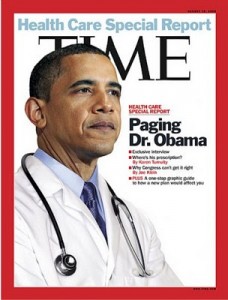At the heart of President Obama’s signature health care law is a simple idea: Bigger is better.
His law incentivizes massive mergers of systems and providers into big players in the marketplace, binding them together to share costs. These new health care behemoths will be managed from Washington, with regulators wielding control from on high.
There’s just one problem. When it comes to health care, “bigger is better” isn’t true. And consumers will pay a huge price for this mistake.
The president’s health care law contains rafts of new regulations, benchmarks, and taxes for providers to deal with. Since these limit profit margins and create new administrative costs, they make it very appealing for health care providers to merge into gigantic, sprawling systems of care. A recent report in The Washington Post noted, “The health care industry is increasingly turning to consolidation as a way to cope with smaller profit margins and higher compliance costs that many anticipate when the federal government’s health care reforms under [Obama’s law] take effect.” Across the health care industry, we’re seeing the merger trend continue to rise.
These large mergers don’t actually translate to better care or to savings for patients. The Wall Street Journal recently reported on a patient from Nevada whose echocardiogram bill came to $373 before a merger and then $1,605 after a merger. The same treatment, in the same office, by the same cardiologist, separated by just six months — but with a price point far higher because the provider had been purchased by a hospital system, allowing for a much higher price to be charged.
The larger a hospital system gets, the more monopolistic control it can exercise over a market, putting insurers over the table when it comes to negotiating rates. Obama’s law accelerates the process, giving these large entities even more incentive to merge through the creation of accountable care organizations (ACOs). These large health care entities will destroy any hope for competition in a marketplace, driving out or buying out independent doctors and extracting as much money as possible from taxpayer-funded entitlements and the privately insured.
We’ve already seen this happen under a system similar to Obama’s, in Massachusetts, where the state’s largest insurer and hospital system collaborated in a secret handshake agreement: The insurer promised to pay the hospital system more money in exchange for an agreement that the hospital would stick all other insurers with the same rate increases. This is classic cartel behavior, and it will only increase under Obama’s law. And thanks to government subsidies and our third-party payer system where patients and providers are insulated from price signals, costs will only continue to increase for the rest of us.
Obama’s ideological associates recently acknowledged the truth about the inability of his law to bend the health care cost curve down. Writing in the New England Journal of Medicine, liberal health care policy wonks such as Ezekiel Emanuel, Donald Berwick, Uwe Reinhardt, Peter Orszag, and many more stated that “health costs remain a major challenge” despite the passage of Obama’s law, and called for “large scale solutions” to address the problem.
If they don’t consider Obama’s law a large-scale solution, I’d hate to see what they would consider one. But instead of reconsidering their path, these big-government technocrats fail to recognize their own responsibility for passing a law that will increase the cost of care because of its anti-market incentives.
Americans are already very familiar with the dangers of big government and big business. Big health care joins the two in a relationship that is collaborative and dangerous, where the taxpayer and the consumer pay the cost. It’s high time we considered breaking up big health care, not doubling down on these market-warping entities that exist only because of government regulation and the compliance costs of Obama’s bureaucratic regime.
— — — — — — — — — —
Benjamin Domenech is a research fellow at the Heartland Institute and managing editor of Health Care News. This article was originally published in the Daily Caller on Sept. 9, 2012.
